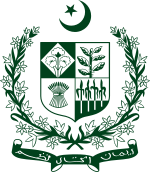Our website is made possible by displaying online advertisements to our visitors.
Please consider supporting us by disabling your ad blocker.
Government of Pakistan
 | |
| Type | Federal government |
|---|---|
| Formation | 14 August 1947 |
| Current constitution | 1973 Pakistani Constitution |
| Country | |
| Seat of government | Islamabad |
| Official languages | |
| Website | Official Website |
| Legislative branch | |
| Legislature | Parliament |
| Upper house | Senate |
| Upper House Presiding officer | Chairman of the Senate |
| Lower house | National Assembly |
| Lower House Presiding officer | Speaker of the National Assembly |
| Meeting place | Parliament House |
| Executive branch | |
| Head of state | President of Pakistan |
| Head of government | Prime Minister of Pakistan |
| Principal organ | Cabinet |
| Meeting place | Cabinet Secretariat |
| Ministries | varies |
| Responsible to | Parliament |
| Judicial branch | |
| Court | Supreme Court of Pakistan |
| Chief judge | Chief Justice of Pakistan |
The Government of Pakistan (Urdu: حکومتِ پاکستان, romanized: hukūmat-e-pākistān) (abbreviated as GoP), constitutionally known as the Federal Government,[a] commonly known as the Centre,[b] is the national authority of the Islamic Republic of Pakistan, a federal republic located in South Asia, consisting of four provinces and one federal territory. The territories of Gilgit-Baltistan and Azad Kashmir are also part of the country but have separate systems and are not part of the federation.[c]
Under the Constitution, there are three primary branches of a government: the legislative, whose powers are vested in a bicameral Parliament; the executive, consisting of the President, aided by the Cabinet which is headed by the Prime Minister; and the judiciary, with the Supreme Court.[1]
Effecting the Westminster system for governing the state, the government is mainly composed of the executive, legislative, and judicial branches, in which all powers are vested by the Constitution in the Parliament, the Prime Minister and the Supreme Court.[2] The powers and duties of these branches are further defined by acts and amendments of the Parliament, including the creation of executive institutions, departments and courts inferior to the Supreme Court.[2] By constitutional powers, the President promulgates ordinances and passes bills.
The President acts as the ceremonial figurehead while the people-elected Prime Minister acts as the Chief Executive (of the executive branch) and is responsible for running the federal government. There is a bicameral Parliament with the National Assembly as a Lower house and the Senate as an upper house. The most influential officials in the Government of Pakistan are considered to be the Federal Secretaries, who are the highest ranking bureaucrats in the country and run cabinet-level ministries and divisions. The judicial branch systematically contains an apex Supreme Court, Federal Shariat Court, High courts of five provinces, district, anti-terrorism, and the green courts; all inferior to the Supreme Court.[2]
The full name of the country is the Islamic Republic of Pakistan. No other name appears in the Constitution, and this is the name that appears on money, in treaties, and in legal cases. The "Pakistan Government" or "Government of Pakistan" are often used in official documents representing the federal government collectively.[2] Also, the terms "Federal" and "National" in government institutions or program names generally indicate affiliation with the federal government. As the seat of government is in Islamabad, "Islamabad" is commonly used as a metonym for the federal government.[2][3][4]
Cite error: There are <ref group=lower-alpha> tags or {{efn}} templates on this page, but the references will not show without a {{reflist|group=lower-alpha}} template or {{notelist}} template (see the help page).
- ^ "About Government". Government of Pakistan. Archived from the original on 24 October 2007. Retrieved 5 March 2009.
- ^ a b c d e Govt. of Pakistan. "Government of Pakistan". Government of Pakistan. Archived from the original on 11 June 2013. Retrieved 18 June 2013.
- ^ "Government tenure ends marking ten years of democracy in Pakistan". Geo News. Archived from the original on 7 October 2021.
- ^ "Here are the highest paid govt departments - The Express Tribune". tribune.com.pk. 17 July 2016.
Previous Page Next Page


